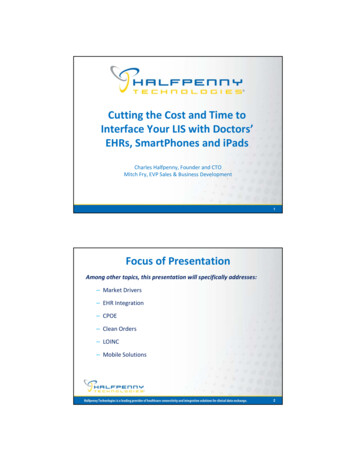
Transcription
337867.IAA15/1/068:20 PMPage 1Cuttingthroughthe ConfusionWhere to Turn for Helpwith Your Investments
337867.IAA25/1/068:20 PMPage 2Cuttingthroughthe ConfusionWhere to Turn for Helpwith Your InvestmentsThere are many reasons you might want help with yourinvestments. Perhaps you want to start a college fundfor your child. Maybe you are concerned that you arenot doing enough to save for retirement. Or maybe yousimply feel the need to get your financial house in order.While some people are comfortable handling their owninvestments, many are not. They find the idea of creating a plan for allocating their assets bewildering, choosing a mutual fund intimidating, and designing an investment portfolio to be one more thing for which theyhave neither the time nor the expertise.This is nothing to be embarrassed about. Investing canbe confusing. The good news is there are thousands ofpeople in the financial services industry who can helpwith financial and investment decisions. Unfortunately,finding the right investment services provider may seemalmost as confusing, intimidating, and time-consumingas choosing the right investments.This brochure was developed by the Coalition forInvestor Education to help you cut through the confusion. It covers those financial services providers – investment advisers, brokers, and financial planners – who provide assistance with securities investments (such asstocks, bonds, and mutual funds) as part of their services. Our goal is to provide some basic information youcan use to find an investment services provider who isright for you – one who offers the services you want onterms you understand and accept.Who We Are: The Coalition for Investor Education ismade up of state securities regulators, consumer advocates, and representatives of the investment adviser andfinancial planning community. See the back panel of thisbrochure for a complete listing of our members.
337867.IAA35/1/068:20 PMPage 3What Types of Providers OfferAssistance With Investments?Investment services providers fall into three categories: Investment advisers Brokers Financial plannersInvestment Advisers. The term investment adviser is alegal term that describes a broad range of people whoare in the business of giving advice about securities (theterm “securities” includes stocks, bonds, mutual funds,and annuities). They may use a variety of titles in addition to investment adviser, such as investment manager,investment counsel, asset manager, wealth manager, orportfolio manager. Investment advisers provide ongoingmanagement of investments based on the client’s objectives, typically with the client giving the adviser authority to make investment decisions without having to getprior approval from the client for each transaction(called discretionary authority).Brokers. The terms broker and broker-dealer are legalterms that refer to people who are in the business ofbuying and selling securities (called trading) on behalf ofcustomers. Individual salespeople employed by brokerage firms are often called stockbrokers and are officiallyreferred to as registered representatives of the brokeragefirm. But these individuals also use many other unofficial titles. These include financial consultant, financialadviser, and investment consultant. In recent years, brokerage firms have increasingly offered a broader rangeof investment planning services in addition to buyingand selling securities.Financial Planners. Unlike the terms investment adviserand broker, financial planner is not a legally defined term.However, it generally refers to providers who developand may also implement comprehensive financial plansfor customers based on their long-term goals. A comprehensive financial plan typically covers such topics asestate planning, tax planning, insurance needs, anddebt management, in addition to more investment-oriented areas, such as retirement and college planning.
337867.IAA45/1/068:20 PMPage 4What Services Do You Want?The search for the right investment services providerstarts with the answer to a seemingly simple question –what services are you looking for? Investment servicesfall into three broad categories: Assistance with buying and selling securities Ongoing management of investments Financial planningThese services are related. Some firms offer all threeunder one roof, while others specialize in just one ortwo.So how do you know what is right for you?You may want an investment adviser to provide ongoing oversight and management of your portfolio ofsecurities. You may simply want a broker to help youwith the mechanics of buying and selling securities. Oryou may want a financial planner to look at your entirefinancial picture – including insurance, taxes, estateplanning, as well as investments – and come up with along-term, comprehensive financial plan.Defining what services you want will help you decidewhich investment services provider is right for you.How Do You Want ToPay for Those Services?Another factor that may affect your choice of investment services provider is how you prefer to pay for services. Your options fall into three basic categories: Percentage of assets under management Commissions FeesProviders may rely on only one compensation method,combine the different compensation methods within anaccount, or offer different compensation options to different clients.Percentage of assets under management. Some investment services providers, including most investmentadvisers, charge a fee based on a percentage of theassets in the client’s account. The percentages chargedcan vary significantly from provider to provider. Also,providers typically charge larger accounts based onlower percentage rates.
337867.IAA55/1/068:20 PMPage 5Commissions. Some providers, including many brokers,receive their compensation based on commissionsclients pay each time they buy or sell a security. This canbe an affordable option for those who expect to tradeonly rarely, but it may expose clients to potential conflicts of interest, such as creating an incentive to recommend frequent trades or particular investment products.Fees. Some providers, including many financial planners,charge fees for their services which clients pay directly tothe provider. They may be hourly fees or a flat fee orretainer fee for a particular service or range of services.They may also include a performance fee based on howwell the client’s account performs.Ultimately, you should determine which method of compensation offers you the lowest total costs and whichmethod best aligns your interests with those of yourinvestment services provider.What are the Differences inProviders’ Legal Obligations?Investment services providers not only offer differenttypes of services and charge for them differently, theyalso are subject to different federal and state regulatoryrequirements and have different legal obligations to theircustomers. Important distinctions – including whetherthe provider has a clear obligation to act in your bestinterests or disclose conflicts of interest – depend onwhich legal category the provider falls into under oursecurities laws.Securities laws recognize two types of providers – investment advisers, who are in the business of giving adviceabout securities, and brokers, who are in the business ofbuying and selling securities on behalf of customers.Investment advisers are subject to a fiduciary duty. Thatmeans they have to put your interests ahead of theirs atall times by providing advice and recommending investments that they view as being the best for you.Investment advisers also are required to provide up-frontdisclosures about their qualifications, what services theyprovide, how they are compensated, possible conflicts ofinterest, and whether they have any record of disciplinary actions against them. They are regulated directly byeither the U.S. Securities and Exchange Commission (SEC)or by state securities regulators, depending on the
337867.IAA65/1/068:20 PMPage 6amount of assets they have under management. You canfind out whether a person or firm is registered or licensedas an investment adviser by calling your state securitiesregulator using the contact information on the NASAAwebsite: www.nasaa.org or by visiting:www.adviserinfo.sec.gov.Brokers are generally not considered to have a fiduciaryduty to customers, although this standard may apply incertain limited circumstances. Instead, brokers arerequired: 1) to know your financial situation well enoughto understand your financial needs, and 2) to recommendinvestments that are suitable for you based on thatknowledge. They are not required to provide up-front disclosure of the type provided by investment advisers. Inaddition to being regulated directly by the SEC and bystate securities regulators, brokers are subject to regulation by industry self-regulatory organizations, includingNAS AA and the New York Stock Exchange. You can findout whether a person or firm is registered or licensed asa broker and check out their disciplinary record by callingyour state securities regulator using the contact information on the NASAA website: www.nasaa.org or by visitinghttp://pdpi.nasdr.com/PDPI/.Financial planners are not separately regulated as planners. Instead, their regulation and the level of responsibility they owe customers depends on the type of servicesthey provide. Planners who provide investment advicemust be registered or licensed as investment advisers andare subject to a fiduciary duty. Those who trade securitiesmust be registered or licensed representatives of brokers.Some financial planners perform other activities that donot involve securities and therefore are not regulatedunder laws governing either investment advisers orbrokers.The legal situation is further complicated by the fact thatdifferent standards can apply when investment providersserve as both investment advisers and brokers. For example, investment advisers who also buy and sell securitiesfor customers must meet the requirements applicable toboth investment advisers and brokers. The same is nottrue of brokers. They are permitted to offer investmentadvice in connection with their brokerage services without being regulated as investment advisers. As a result,the advice they offer is subject to the suitability standardthat governs brokerage activities rather than the higherfiduciary duty that applies to investment advisers.
337867.IAA75/1/068:20 PMPage 7Investor ChecklistThe key to finding the right investment services provideris asking the right questions – both of yourself and ofprospective providers. Following are some questions thatshould help you identify the right provider for you.Remember, there are no foolish questions. Any reputableprovider should be happy to discuss these issues withyou and answer any questions you may have.Questions to Ask Yourself Before You Invest Do you need help developing strategies to reach yourfinancial goals or do you simply want suggestions onappropriate investment products to implement yourgoals? Do you want assistance with a few targeted areas, or doyou need a comprehensive plan for your finances? Do you already have a portfolio of investments youwould like help managing? How involved do you want to be in decisions about yourspecific investments? Do you prefer paying for investment services through afee, commissions, a percentage of assets in your account,or a combination of these? Do you prefer working with someone who is primarilyconsidered a salesperson, an adviser, or a combinationof the two? How important is it to you that your provider have alegal obligation to act in your best interests and disclosepotential conflicts of interest?Questions to Ask Your Investment Services Provider What services do you offer? What qualifications do you have to offer those services? How do you charge for those services? Do you receivecompensation from other sources if you recommend thatI buy a particular stock, mutual fund, or bond? Would my account be an advisory account or abrokerage account? Are you required by law to always act in my bestinterests? Will you put that commitment in writing? What potential conflicts of interest do you have whenrecommending investment products to me, and will youdisclose those conflicts? Will you provide me with a written record of anydisciplinary history for you and your firm? Will you give me your Form ADV (the registration formthat must be filed by investment advisers) and/oryour Form U4 (the registration form used by personswho work with brokers)?
337867.IAA85/1/068:20 PMPage 8Coalition on Investor EducationThe Coalition on Investor Education is made up of consumer advocates, state securities regulators, and representatives of the investment adviser and financial planningcommunity, including:Consumer Federation of America is a non-profit associationof approximately 300 national, state, and local pro-consumerorganizations. It was founded in 1968 to advance theconsumer interest through research, education, and advocacy.www.consumerfed.orgOrganized in 1919, the North American SecuritiesAdministrators Association is the oldest international organization devoted to investor protection. NASAA members includestate, provincial, and territorial securities administrators in theUnited States, Canada, and Mexico. www.nasaa.orgThe Investment Adviser Association is a non-profit organizationthat represents federally registered investment advisory firms.Founded in 1937, the IAA’s membership consists of more than400 companies that provide investment advice to a wide varietyof individual and institutional clients. www.investmentadviser.orgThe Financial Planning Association is the membership organization for the financial planning community. Its 28,500 membersare dedicated to supporting the financial planning process inorder to help people achieve their goals and dreams.www.fpanet.orgA global membership organization that awards the CFA designation, CFA Institu
and broker, financial planneris not a legally defined term. However, it generally refers to providers who develop and may also implement comprehensive financial plans for customers based on their long-term goals. A compre-hensive financial plan typically covers such topics as estate planning, tax planning, insurance needs, and debt management, in addition to more investment-ori-ented areas .











